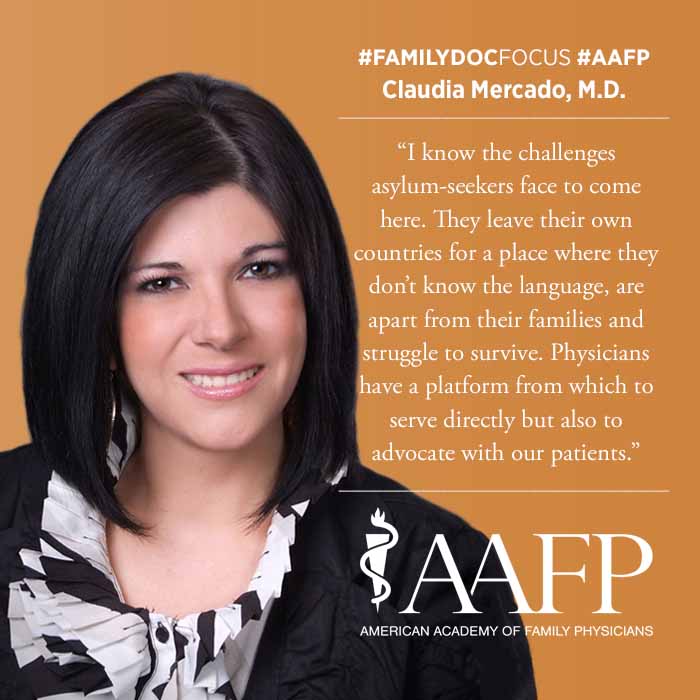Caring for Immigrants at the Border and on Capitol Hill
October 7, 2019 11:05 am David Mitchell –
Claudia Mercado, M.D., was attending a National Hispanic Medical Association meeting this spring when she heard pediatricians from El Paso, Texas, talking about the work they were doing to help asylum-seekers in that border town.
Mercado, who splits time between her clinics in Laredo, Texas, and Greensboro, N.C., was motivated to find out what was happening in her own Texas border town. What she found was upsetting.
"Conditions were horrible," she said. "I wanted to do something."
U.S. Customs and Border Protection was releasing two busloads of migrants per day -- one in the morning and one at night -- near the border, she said. A faith-based nonprofit opened La Frontera Shelter in March to offer food, shelter, clothing and a place for reunification for migrants, the majority of whom had arrived at the border in family units.
Mercado's clinic is just minutes from the shelter, so she went to see what she could do to help.
"I asked if anyone needed a doctor," she said. "People started lining up."
And the lines kept growing.
Mercado saw people who were dehydrated, depressed and suffering from anxiety, and others who were severely ill.
"I thought, 'We need help. This is a public health crisis,'" Mercado said.
Before her next trip to the shelter, Mercado used her own money to purchase a scale, thermometer, gloves and OTC medications.
On weekdays, Mercado worked from 8 a.m. to 5 p.m. at her own clinic and from 5 to 10 p.m. at the shelter. She also put in 10-hour days at the shelter on weekends.
In August, CBP implemented the administration's, "Migrant Protection Protocols" policy in Laredo, which requires migrants to stay on the Mexican side of the border until asylum requests are processed.
From March to August, Mercado said the shelter aided roughly 20,000 people, while its clinic treated about 6,000. Now the number of asylum-seekers entering at Laredo has dropped from 200 a day to less than 10, Mercado said.
During the peak volume period, Mercado turned to groups such as Physician Moms and Physician Women for Democratic Principles on Facebook for help and received money for supplies, as well as volunteers.
"I had patients with influenza, but who was going to pay for Tamiflu?" said Mercado, who is still seeking physician volunteers to help in the border clinic.
Mercado's work with immigrants isn't limited to the care she provides at the border. She moved from Laredo to Greensboro two years ago when her husband changed jobs, but she kept the Texas clinic open and rotates sites every week. She said she kept her Laredo clinic open because the city is one of the poorest in the Lone Star State and it suffers from a shortage of health professionals. Per capita annual income in Laredo, which is 95% Hispanic, is less than $17,000, according to the U.S. Census.
Mercado opened a direct primary care practice in Greensboro because the area has a large uninsured immigrant population. Patients pay her a fee every three months, and she helps them find affordable medications and labs.
Mercado was invited to submit a policy brief about the work she has done with colleagues at La Frontera -- including recommendations to improve the process of providing care to asylum-seekers -- by the staff of Rep. Henry Cuellar, D-Texas. She is scheduled to meet with Cuellar's staff Oct. 18 in Washington, D.C.
"I'm a first-generation immigrant myself," said Mercado, who came to the United States as a student at 17 and became a U.S. citizen while she was in medical school. "I know the challenges asylum-seekers face to come here. They leave their own countries for a place where they don't know the language, are apart from their families and struggle to survive. Physicians have a platform from which to serve directly but also to advocate with our patients as they struggle with so many intersecting social determinants of health. We are at a critical moment, when we can leverage our power for so much good."
